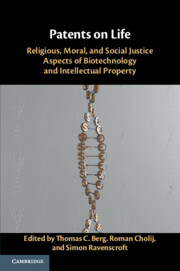 Patents on Life
Patents on Life Book contents
- Patents on Life
- Patents on Life
- Copyright page
- Contents
- Contributors
- Prefatory Note and Acknowledgements
- Opening
- I Life Patents, Law, and Morality
- II Religious Perspectives on Life Patents
- 5 Intellectual Property Rights and the Fundamental Right to the Commons in the Light of Catholic Social Teaching
- 6 Human Rights and Life Patents: Lessons from the Church’s Social Teaching and Engagement in the United States
- 7 Intellectual Property and Genetic Sequences: A Jewish Law Perspective
- 8 Intellectual Property, Islamic Values, and the Patenting of Genes
- 9 Christian Libertarianism and the Curious Lack of Religious Objections to the Patenting of Life Forms in the United States
- 10 From Chakrabarty to Myriad and Beyond: Catholic Contributions to the Gene-Patenting Debate
- III Social Justice and Political Aspects
- Closing
- Index
10 - From Chakrabarty to Myriad and Beyond: Catholic Contributions to the Gene-Patenting Debate
from II - Religious Perspectives on Life Patents
Published online by Cambridge University Press: 28 September 2019
- Patents on Life
- Patents on Life
- Copyright page
- Contents
- Contributors
- Prefatory Note and Acknowledgements
- Opening
- I Life Patents, Law, and Morality
- II Religious Perspectives on Life Patents
- 5 Intellectual Property Rights and the Fundamental Right to the Commons in the Light of Catholic Social Teaching
- 6 Human Rights and Life Patents: Lessons from the Church’s Social Teaching and Engagement in the United States
- 7 Intellectual Property and Genetic Sequences: A Jewish Law Perspective
- 8 Intellectual Property, Islamic Values, and the Patenting of Genes
- 9 Christian Libertarianism and the Curious Lack of Religious Objections to the Patenting of Life Forms in the United States
- 10 From Chakrabarty to Myriad and Beyond: Catholic Contributions to the Gene-Patenting Debate
- III Social Justice and Political Aspects
- Closing
- Index
Summary
Distinctively Catholic voices have contributed to public debate over the patenting of human life from its very beginnings (since the Supreme Court’s landmark 1980 Chakrabarty decision). This essay reviews these contributions and assesses them in light of Audrey Chapman’s recent criticism that, in general, religious contributions to the debate over gene patenting have been intermittent, fragmented, and less interested in shaping actual patent law and policy, especially in the US, than in mounting a “prophetic” critique of what are taken to be the various problematic political, social, and economic assumptions undergirding such law and policy. In response to Chapman’s critique, the essay demonstrates how a theologically coherent and ethically rigorous contribution to the public debate over gene patenting–one that is not exclusively “prophetic”–can be discerned in the work of two influential Catholic theologians, Lisa Sowle Cahill and Cathleen Kaveny. Going beyond both Cahill and Kaveny, and in contrast to the widely shared assumptions about divine ownership that underlie their (and most other) theological contributions to this debate, the essay proposes that recapturing the late Herbert McCabe’s point that God literally owns nothing would allow the formulation of a more adequate theological contribution to the bioethical debate over gene patenting.
Keywords
- Type
- Chapter
- Information
- Patents on LifeReligious, Moral, and Social Justice Aspects of Biotechnology and Intellectual Property, pp. 165 - 184Publisher: Cambridge University PressPrint publication year: 2019
